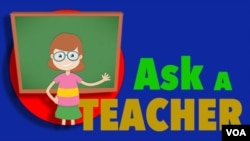Welcome to Ask a Teacher – a new program where readers ask questions and teachers answer them.
Have you noticed that English is full of words that have similar meanings? In today’s Ask a Teacher, Mika from Japan asks how to decide among three verbs that all mean “give an idea about something.”
Here is her question:
Question:
I don’t understand the difference between "look," "appear" and “seem." If I say, “His new haircut makes him appear younger,” is it correct? - Mika, Japan
Answer:
Hello Mika and thanks for your question!
You can use “appear” in that situation, but the better verb would be “look.”
Let me give you the reasons why.
Look
We use both the verbs “look” and “appear” to talk about a condition we have observed. In your sentence, you can see with your eyes how stylish the man’s new haircut is. You also see that it gives his face a more youthful shape.
But “look” is more informal than the verb “appear.” Your sentence sounded informal, as if you were talking to a friend.
Appear
In contrast, you might see the word “appear” in writing, or hear it in formal speech, such as an official news report. For example, a news reporter might say, “The suspect appeared to be fleeing the scene.”
As that example shows, “appear” is commonly used to talk about events and facts.
Seem
Your third choice, “seem” also means “to create an idea or impression.” But “seem” does not suggest a direct observation. For example, you and I may have talked on the phone, and you told me about your great new job and recent vacation. Afterward, I could say, “Mika seems happy,” even though I never saw you smile.
Take Note
Keep in mind one other difference among the three words. “Seem” and “appear” are often followed by an infinitive verb, such as “The baby seems to want her bottle…” or “The man appears to be waving.”
But, in everyday English, the verb “look” is often followed by an adjective. For example: “He looks tired.”
And that’s Ask a Teacher.
I’m Alice Bryant.
Do you have an English language question for Ask a Teacher? Write to us in the Comments section. Be sure to list your country.
________________________________________________________________
Words in This Story
haircut – n. the act or result of cutting and shaping someone's hair
informal – adj. having a friendly and relaxed quality
formal – adj. suitable for serious or official speech and writing
impression – n. an appearance or suggestion of something





